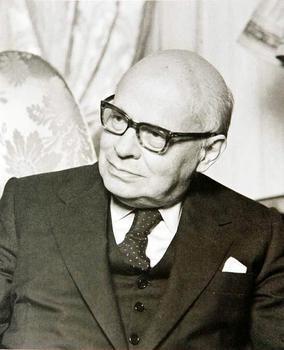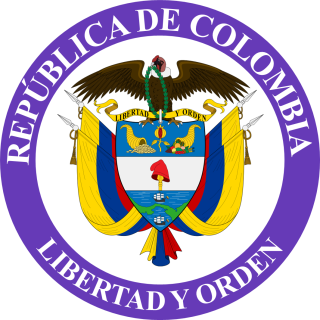
Carlos Alberto Lleras Restrepo was a Colombian politician and lawyer who served the 22nd President of Colombia from 1966 to 1970.
Instituto Nacional de Industria was a Spanish state-owned financing and industrial holding company established in Francoist Spain for the development of industry and social control. It was succeeded by the Sociedad Estatal de Participaciones Industriales (SEPI) in 1995.

Nicaragua is a country in Central America with constitutional democracy with executive, legislative, judicial, and electoral branches of government. The President of Nicaragua is both head of state and head of government. Executive power is exercised by the government.
Water supply and sanitation in Colombia have been improved in many ways over the past decades. Between 1990 and 2010, access to improved sanitation increased from 67% to 82%, but access to improved water sources increased only slightly from 89% to 94%. In particular, coverage in rural areas lags behind. Furthermore, despite improvements, the quality of water and sanitation services remains inadequate. For example, only 73% of those receiving public services receive water of potable quality and in 2006 only 25% of the wastewater generated in the country underwent any kind of treatment.
Water supply and sanitation in Venezuela is currently limited and many poor people remain without access to piped water. Service quality for those with access is mixed, with water often being supplied only on an intermittent basis and most wastewater not being treated. Non-revenue water is estimated to be high at 62%, compared to the regional average of 40%. The sector remains centralized despite a decentralization process initiated in the 1990s that has now been stalled. Within the executive, sector policies are determined by the Ministry of Environment. The national water company HIDROVEN serves about 80% of the population.

The electricity sector in Bolivia is dominated by the state-owned ENDE Corporation, although the private Bolivian Power Company is also a major producer of electricity. ENDE had been unbundled into generation, transmission and distribution and privatized in the 1990s, but most of the sector was re-nationalized in 2010 (generation) and 2012.
Eduardo Ignacio Verano de la Rosa is a Colombian politician, businessman, and active member of the Colombian Liberal Party. He served as Governor of Atlántico Department from 2008 to 2011 and from 2016 to 2019, and as Colombian Minister of Environment from 1997 to 1998.

The power sector in the Dominican Republic has traditionally been, and still is, a bottleneck to the country's economic growth. A prolonged electricity crisis and ineffective remedial measures have led to a vicious cycle of regular blackouts, high operating costs of the distribution companies, large losses including electricity theft through illegal connections, high retail tariffs to cover these inefficiencies, low bill collection rates, a significant fiscal burden for the government through direct and indirect subsidies, and very high costs for consumers as many of them have to rely on expensive alternative self-generated electricity. According to the World Bank, the revitalization of the Dominican economy depends greatly on a sound reform of the sector.
Guillermo Abadía Morales was a Colombian linguist, academic, anthropologist, folklore researcher and indigenous language expert. Abadía Morales was one of the first to champion the study of indigenous languages in Colombia.

The Ministry of Justice and Law, is the national executive ministry of the Government of Colombia responsible for the administration of law and justice, equivalent to the justice ministries of other countries.

Omar Guerrero Orozco, Ph.D. in Public Administration by the National Autonomous University of Mexico, is full-time professor at the same institution and National Researcher Level III, which is the maximum level. He was director of the National Institute of Public Administration magazine from 1980 to 1982. He was member of the Social Sciences Committee of the National System of Researchers, collegial body in which he served as president (2003). He was recipient in 1979 of the “Public Administration Award” granted by the INAP. Guerrero is also member of the National Academy of Sciences since 1987 and of the Mexican Culture Seminar since 2006.
The Autonomous State Entities and Decentralized Services are two types of government-owned corporations typical of the Uruguayan state.

Banco del Estado de Chile, commercially operating under the brand BancoEstado, is the only Public Bank in Chile and was created by government decree in 1953. It provides financial services to consumers and companies, with a focus on national coverage in terms of geography and social sectors and a particular emphasis on the unbanked and small and medium enterprises, although it serves all types of businesses. It is the country's largest mortgage lender and largest issuer of debit cards. In addition, BancoEstado performs part of the Chilean government's financial activities through the accounts managed by the General Treasury of the Republic of Chile.
Alicia Girón González is the past president of the International Association for Feminist Economics (IAFFE), her tenure was 2014 to 2015. Girón has also served as director of Universidad Nacional Autónoma de México's (UNAM) Economic Research Institute (IIEc).

The Ministry for the Economy, Development, and Tourism is a Chilean state ministry in charge of planning and executing the flow of policies and projects of the Chilean government. The ministry aims to generate feasible and sustainable economic development, with stable progressive equality in the allocation of economic interests. The current Minister of Economy, Development, and Tourism is Nicolás Grau.

Gonzalo Hernández Licona is a Mexican economist and distinguished scholar in the fields of poverty measurement, economic development and social program evaluation. Hernández Licona holds a PhD in Economics from the University of Oxford, a Masters in Economics from the University of Essex and a B.A. in Economics from the Mexico Autonomous Institute of Technology (ITAM).
María Claudia Rojas Lasso is a Colombian jurist who serves as chairman of the Investigative Chamber of the FIFA Ethics Committee since 11 May 2017. From January 2014 to March 2015, she was the judge of the country's highest administrative court as President of the Council of State of Colombia. She is a specialist in bioethics and an expert in analysis and conflict resolution and graduated in international tax law.